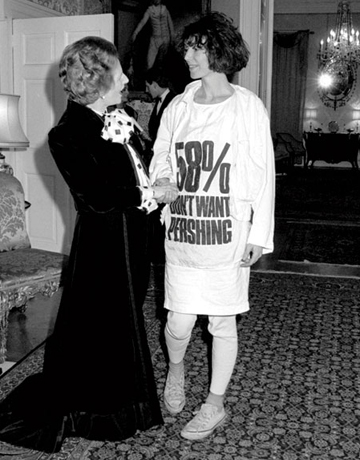girl versus wardrobe

I have this picture on my wall of fashion designer Katharine Hamnett meeting Margaret Thatcher in 1984. Hamnett, who had just been named designer of the year, was invited to Downing Street and, seizing the opportunity to make a statement, took off her coat to reveal the anti-missile message on her t-shirt. It’s often recognised as one of the most iconic moments in fashion history (although it receives a lot less air time than moments like this, this and this).
The picture on my wall is captioned “dress as though your life depends on it”. I think what it’s trying to tell me is “make your clothes mean something”. But what do clothes mean for women in a post-feminist world?
When I was 17, my clothes meant “fuck the establishment” in a way that only a middle-class teenager can mean it. I wanted to fuck the vague, unknown establishment, but I also wanted to wear brand-name sneakers and band t-shirts. Luckily, consumerism had recognised this market of label-obsessed rich kids who wanted to act like the burnouts in 1980s high school movies and I could buy items of clothing embellished with skulls and obscene slogans at boutiques that took Mastercard.
In my slightly more liberal and impoverished-student twenties, clothes have offered anything from an alternative to being naked at any given moment to a visual statement of my tastes and personality (‘Oh, these? Just some vintage loafers I picked up at the RSPCA thrift store because I love animals and sustainability and Molly Ringwald totally wore some similar in Sixteen Candles’. ‘Yes, this huge sparkly jumper is designed to indicate that I have a dazzling personality to match and also to hide my post-dumpling belly while I dance’). They’ve also offered numerous totally neurotic complexes. I’ve skipped entire days of class simply because I couldn’t find anything to wear.
It might sound a little Cher Horowitz, but being ensembly challenged goes beyond rocking out in a cute yellow tartan twosie. Whether we mean to or not, we often find ourselves trying to figure out a person’s age, gender, sexuality, tastes and interests based just on what they’re wearing. As young adults, our identities are so closely associated with how we dress; as young women, this is especially so. With such a high standard of beauty placed on womanhood by the media — and by ourselves — our clothes have become just as important as our faces and our bodies.
The expectation for women to present themselves immaculately has been present for so long that most of us have come to ignore it. Most of the time, I do. Most of the time, I understand that for women, clothes often mean a lot of things they shouldn’t, and I shrug it off and wear whatever I want anyway. Most of the time, but not all the time.
We all know what it’s like to be inappropriately ogled or ridiculed because our skirt is too short or too long, our blouse too low-cut or too ill-fitting. I abhor the fact that I have to allow the slut/prude dichotomy dictate my dress sense, but even I have to admit that the pressure on women to dress goes beyond that, and it goes beyond embodying a subculture or a stereotype. What keeps me at home in pyjamas when I should be in class not failing the participation component of my semester grade is a total and ridiculous incapacity to deal with the pressure to dress as though my life depends on it.
What conclusions people draw from my clothes about my taste in music or which gender of naked body I prefer to touch is beyond my control and beyond my care factor. What conclusions people draw from my clothes about my sexual availability and whether or not I am “asking for it” is nothing short of dangerous and oppressive bullshit. But the conclusions people draw from my clothes about my womanhood, about how comfortable I am in it and about how uniquely mine it is — those are the conclusions that leave me stranded on the bed when I should be at a party with my hands in the air like I literally just don’t care.

